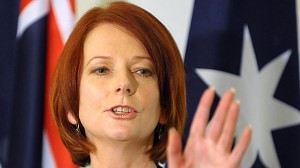 Robust debate on uranium and gay marriage is what the Labor conference needs.
Robust debate on uranium and gay marriage is what the Labor conference needs.
Labor meets next month in Sydney. As Australia’s oldest and largest political party, we must take our opportunity to speak to the country, to be clear about Labor’s vision for the future.
Anyone who joins a political party loves an argument. Sometimes those arguments get noisy, but that’s a healthy sign. A party able to hold robust debates is a party full of energy and ideas for the future.
That’s why I’m looking forward to some noise being made in Sydney. A quiet conference would disappoint because it would mean our party was lying dormant in the face of the challenges that face us.
As Australia becomes one of the richest countries in the world, how can we ensure fair shares for all? How can we ensure that no one is left behind by accident of birth or circumstance? How can we combine prosperity with stewardship of the environment?
As a party, these are questions for discussion, but as a government we have the privilege – and responsibility – of implementing our decisions. Our debates have real outcomes. Nowhere is this more true than in economic policy.
Labor has always been the party of jobs, and as a government we take pride in creating more than 700,000 jobs and supporting working people through the global financial crisis. Our unemployment rate is now 5.2 per cent – a stark contrast to the US, Britain and Europe.
We are determined to keep our economy and our businesses strong. Through the hard work of businesses and employees, supported by government, we are meeting the aspirations of working families for decent secure jobs, fair treatment at work and better ways of balancing work and family life. In doing this hard work and in ensuring fairness and respect in Australian workplaces, we are proud to operate in partnership with our colleagues from the union movement.
But just as I have said to the nation that we must analyse and understand the opportunities and challenges of this Asian century, the Labor Party too has to focus on our long-term economic goals and be prepared to confront difficult questions about maximising prosperity and the strength of our relationships in our region of the world.
One of our nearest neighbours is India. Long a close partner. The world’s biggest democracy. Growing at 8 per cent a year. Yet despite the links of language, heritage and democratic values, in one important regard we treat India differently. We will not sell India uranium for peaceful purposes – though Canada is preparing to – while policy allows us to export it to countries such as China, Japan and the United States.
It is time for Labor to modernise our platform and enable us to strengthen our connection with dynamic, democratic India. As in other areas, broadening our markets will increase jobs. We must, of course, expect of India the same standards we do of all countries for uranium export – strict adherence to International Atomic Energy Agency arrangements and strong bilateral undertakings and transparency measures that will provide assurances our uranium will only be used for peaceful purposes.
There are two other debates that will be lively. The first is on same-sex marriage, a debate that elicits strongly held personal views across society. I am proud that Labor has been at the forefront of changing our laws to end discrimination against same-sex couples in so many areas. We have come a long way as a more inclusive and fair society in a relatively short time.
However, I equally recognise the deeply held convictions in society on the questions of marriage. This diversity of public opinion is reflected in the passionate debate inside the Labor Party. Given the personal nature of the issue and the deeply held beliefs, I believe that in future it is appropriate that a conscience vote flow to Labor parliamentarians. They should be free to vote in the Parliament according to their own values and beliefs.
Many will ask, what is my personal opinion and where do I stand in the debate? As I have said many times, I support maintaining the Marriage Act in its current form, and the government will not move legislation to change it. My position flows from my strong conviction that the institution of marriage has come to have a particular meaning and standing in our culture and nation and that should continue unchanged. The Labor Party platform currently reflects this view.
This is a debate I have not shirked from, and it is one the party will hold. What we must do when that debate is over is to respect each other’s point of view.
The second issue is party reform. I want a Labor Party that is growing in membership, with an extra 8000 members as a first step. In every community, there are far more loyal Labor supporters than there are ALP members. If we can directly engage the community in selecting the best Labor candidates by trialling ”community preselections”, or primaries, we can tap into that deeper support.
Personally, I am looking forward to conference. I always do. But this year, with the global economy at a crossroads, Australia faces some important choices too. We can continue to face the future with confidence if we make the right choices.
• Julia Gillard is Prime Minister.
For the original article, click here.
